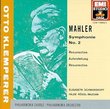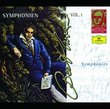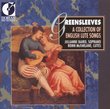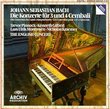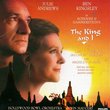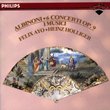| All Artists: Richard Strauss, Heinz Fricke, Julia Varady, Bernd Weikl, Münchner Rundfunkorchester, Tölzer Knabenchor, Chor des Bayerischen Rundfunks, Helmut Berger-Tuna, Marga Schiml, Carmen Anhorn, Hans-Dieter Bader, Ruthild Engert, Raimund Grumbach, Friedrich Lenz, Manfred Schenk Kaja Borris, Willi Brokmeier, Gerhard Schmidt-Gaden Andrea Trauboth Title: Strauss - Feuersnot, opus 50 (Ein Singspiel in einem Akt) / Varady · Weikl · Fricke Members Wishing: 0 Total Copies: 0 Label: Arts Music Release Date: 8/17/1999 Genre: Classical Style: Opera & Classical Vocal Number of Discs: 2 SwapaCD Credits: 2 UPC: 600554754628 |
Search - Richard Strauss, Heinz Fricke, Julia Varady :: Strauss - Feuersnot, opus 50 (Ein Singspiel in einem Akt) / Varady · Weikl · Fricke
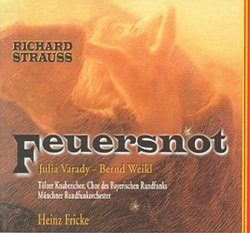 | Richard Strauss, Heinz Fricke, Julia Varady Strauss - Feuersnot, opus 50 (Ein Singspiel in einem Akt) / Varady · Weikl · Fricke Genre: Classical
|
Larger Image |
CD DetailsSimilarly Requested CDs |
CD ReviewsNecessary Strauss for Opera lovers Russel E. Higgins | 04/10/2000 (4 out of 5 stars) "Richard Strauss never forgot or forgave the city of Munich for its rejection of his first opera, "Guntram." He constructed a tombstone memorial to the opera at his villa in Garmisch (it still exists.) He avenged himself on Munich, the city of his birth, by composing the opera "Feuersnot," in which the reactionary burghers of Munich are deprived of fire (the warmth and brightness of creativity) by a noble magician named Kunrad (in reality Richard Strauss). It is a short, ninety-minute work, filled with allegory and inventive music that should enchant lovers of Strauss and modern German music. The libretto, written by Ernst Wolzogen, is a parody of Wagner's "Die Meistersinger" and the Ring Cycle, and Strauss composes some lovely music, creating a pastiche of tunes reminiscent of "Hansel und Gretel," and "Die Meistersinger," and even quoting music from "Das Rheingold," "Eugene Onegin," "Guntram," and Munich street music. Much of Strauss's music for "Feuersnot" looks forward especially to "Der Rosenkavalier" and "Arabella"; but there are also hints of "Die Frau ohne Schatten" and "Capriccio" in it. The lovely waltzes, for example, on band 6 of the first CD, are vintage Strauss; the love duet is reminiscent of "Arabella"; and the finale sounds like early "Die Frau ohne Schatten." Strauss utilizes a huge orchestra, although, as the composer himself admits, the orchestrations are not as developed as in his later work. An enchanting children's chorus runs throughout the opera, beautifully performed by Toelzer Knaben Chor of Munich. I am happy to report that the recording is an excellent one. The CD's evidentally come from a 1985 radio broadcast by Munich Radio. Bernd Weikl, a fine, experienced Wagnerian baritone who has performed many of Strauss's roles, is in glorious voice for the demanding baritone role of Kunrad. Julia Varady is equally excellent as Diemut, a sort of Wagnerian character, who, at first, rejects her lover and then embraces him in the grand finale. Smaller, but important roles, are taken by such singers as Keith Engen, Friedrich Lenz, and Willi Brockmeier, prominent singers from the Bayrische Staatsoper who have sung leading roles since the 1950's. Heinz Fricke conducts a unified and exuberant performance. ARTS was wise to offer the two CD set for the price of one CD, a value to the opera collector. Unfortunately, Wolzogen's libretto that accompanies the set is only in German (actually a wild, Bavarian dialectical pastiche that is almost impossible to translate.) However, the English notes and synopsis by Karl Schumann are well-written and extensive; it is indeed possible to follow the opera after studying Schumann's notes. Unless you travel to Munich during a commemorative festival, you will probably never see "Feuersnot" performed; however, by listening to this fine recording, you will understand the dramatic genius of early Strauss, and hear some delightful music that led up to his more famous operas!" Strauss in his prime P. J. Keating | New York, NY USA | 08/12/2008 (5 out of 5 stars) "This is a terrific performance of a work that should be better known. Salome and Elektra were right around the corner. But be aware that there might be a "hardware problem" with this set of CDs. Disk 2 is mislabeled on my copy. It thinks it is Disk 2 of Peter Maag's recording of Gluck's Orphee & Euridice! This is from the disk label. I actually ordered two sets of this opera and they both had the same problem, so there may be other "defective" sets out there. When the second set arrived with the same defect as the first, on a hunch, I popped disk 2 into my computer and let MusicMatch tell me what was actually on it. With this confirmation that the disk was simply mislabeled, I printed up my own labels and now I'm, if not happy, at least content. It would have been nice if the CD company had at least included an errata sheet. Speaking of errata, by the way, this recording is accompanied by an essay in three languages by Karl Schumann, who writes like a parody of a professor. The English translation has many hilarious typos. Nevertheless it was useful. The libretto, by Richard Strauss himself, is included in German only. " Worth a listen - but not top-drawer Strauss Ralph Moore | Bishop's Stortford, UK | 10/15/2008 (3 out of 5 stars) "I cannot be quite as enthusiastic as Mr Higgins in his Amazon.com review of 2000 about this, Strauss' second opera - although, this being Strauss, there are indeed many lovely moments in the music and it is fun trying to spot the allusions to his own, Wagner's and Humperdinck's operas in his pastiche. The best things here are the bright, silvery soprano of Julia Varady - a highlight is her track 10 aria - and the excellent Toelzer Knabenchor, who have some charming, folksy, quasi-mediaeval music. Bernd Weikl, while an experienced baritone, is here, in 1985, already beginning to sound a little worn and bleaty from too many heavy Wagner roles. I have to disagree with Mt Higgins about the quality of the supporting cast-members; too many - indeed most - of them sound distinctly elderly and unimpressive, with lots of laboured vibratos - but the three "Gestspielin" (Strauss' version of the Rhinemaidens) are lovely. This recording is from a radio broadcast and I have no real complaints about the sound, although it is a little dull-edged. The music itself is beautifully played by the Rundfunkorchester and really sounds idiomatically Straussian in the conductor Fricke's hands, but it takes a long while to get going and the opera is well on towards its climax before we begin to recognise the Strauss we know and love. Strauss finales are never disappointing and, just as some bald spots in "Friedenstag" are redeemed by its splendid C major hymn, "Feuersnot" concludes with a magical ensemble. So this is certainly more rewarding than "Guntram" (see my review) and not necessarily just for Strauss completists."
|

 Track Listings (11) - Disc #1
Track Listings (11) - Disc #1